Except的用法
except的用法和例句
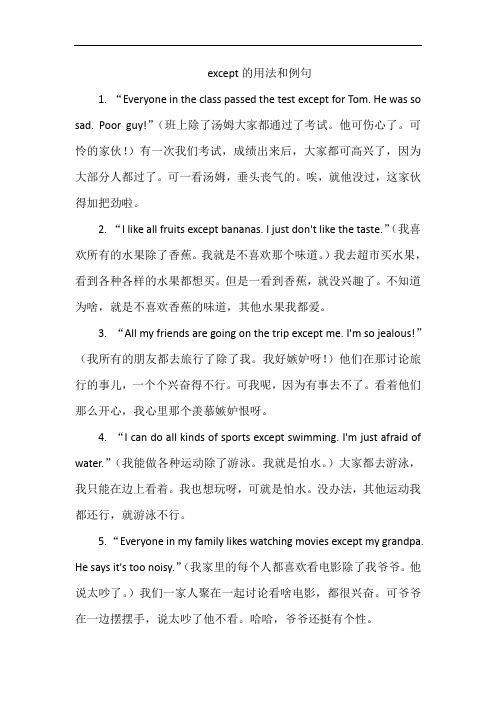
except的用法和例句1. “Everyone in the class passed the test except for Tom. He was so sad. Poor guy!”(班上除了汤姆大家都通过了考试。
他可伤心了。
可怜的家伙!)有一次我们考试,成绩出来后,大家都可高兴了,因为大部分人都过了。
可一看汤姆,垂头丧气的。
唉,就他没过,这家伙得加把劲啦。
2. “I like all fruits except bananas. I just don't like the taste.”(我喜欢所有的水果除了香蕉。
我就是不喜欢那个味道。
)我去超市买水果,看到各种各样的水果都想买。
但是一看到香蕉,就没兴趣了。
不知道为啥,就是不喜欢香蕉的味道,其他水果我都爱。
3. “All my friends are going on the trip except me. I'm so jealous!”(我所有的朋友都去旅行了除了我。
我好嫉妒呀!)他们在那讨论旅行的事儿,一个个兴奋得不行。
可我呢,因为有事去不了。
看着他们那么开心,我心里那个羡慕嫉妒恨呀。
4. “I can do all kinds of sports except swimming. I'm just afraid of water.”(我能做各种运动除了游泳。
我就是怕水。
)大家都去游泳,我只能在边上看着。
我也想玩呀,可就是怕水。
没办法,其他运动我都还行,就游泳不行。
5. “Everyone in my family likes watching movies except my grandpa. He says it's too noisy.”(我家里的每个人都喜欢看电影除了我爷爷。
他说太吵了。
)我们一家人聚在一起讨论看啥电影,都很兴奋。
可爷爷在一边摆摆手,说太吵了他不看。
哈哈,爷爷还挺有个性。
6. “I can eat almost anything except spicy food. It burns my mouth!”(我几乎能吃任何东西除了辣的食物。
英语 except 和 except for的区别
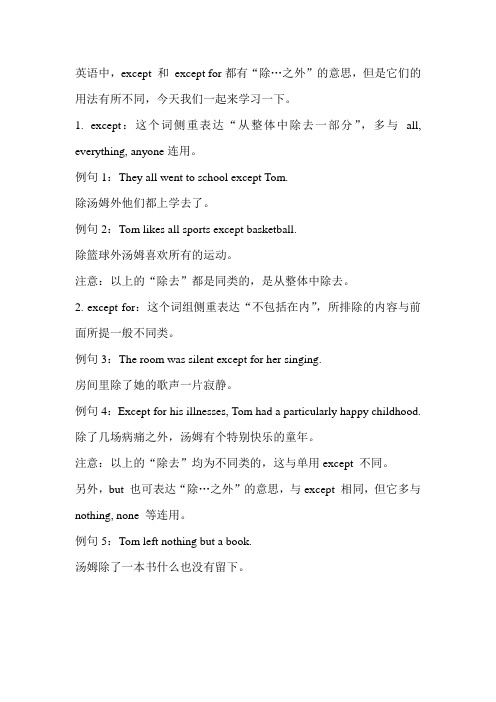
英语中,except 和except for都有“除…之外”的意思,但是它们的用法有所不同,今天我们一起来学习一下。
1. except:这个词侧重表达“从整体中除去一部分”,多与all, everything, anyone连用。
例句1:They all went to school except Tom.
除汤姆外他们都上学去了。
例句2:Tom likes all sports except basketball.
除篮球外汤姆喜欢所有的运动。
注意:以上的“除去”都是同类的,是从整体中除去。
2. except for:这个词组侧重表达“不包括在内”,所排除的内容与前面所提一般不同类。
例句3:The room was silent except for her singing.
房间里除了她的歌声一片寂静。
例句4:Except for his illnesses, Tom had a particularly happy childhood. 除了几场病痛之外,汤姆有个特别快乐的童年。
注意:以上的“除去”均为不同类的,这与单用except 不同。
另外,but 也可表达“除…之外”的意思,与except 相同,但它多与nothing, none 等连用。
例句5:Tom left nothing but a book.
汤姆除了一本书什么也没有留下。
except的用法

except的用法except用作动词时的基本含义是“把……除外,不包括在内”,通常表示同类之间的关系。
常用于肯定句或疑问句中,有时也可用于否定句或句子的否定形式中。
1、except用作动词时,其意思是“没有”“不是”“除外”“反对”,后面可接名词或代词,也可接动名词,但不能接不定式。
例句:We had a pleasant chat, except that he constantly sneezed.翻译:我们聊得很愉快,只是他不停地打喷嚏。
2、except用作介词时,其意思是“除……之外”,通常指所排除的事物不在所述范围之内,后面可接名词或代词,也可接动名词,但不能接不定式。
例句:If the king taxed his subjects strictly, not allowing them to have any firearms, the mission would not be in such a perilous situation except for John, who was a renegade.翻译:如果国王严苛地对其臣民征税,不允许他们拥有任何火器,那么除了约翰这个叛徒以外,使团就不会处于如此危险的境地。
3、except与but两者都表示“除外”,但后者用在肯定句中较多,而前者用在否定句、全部肯定句或“排除式”的陈述句中较多。
例句:We all failed except John.翻译:除了约翰,我们都失败了。
4、except的另一意思是“反对”,这是指对某人或某事持有异议或持反对的态度。
例句:Do you have any exception on this?翻译:你反对吗?以上是except的一些常见用法,具体的使用场景需要根据实际情况进行判断。
辨析except,exceptfor(that),besides
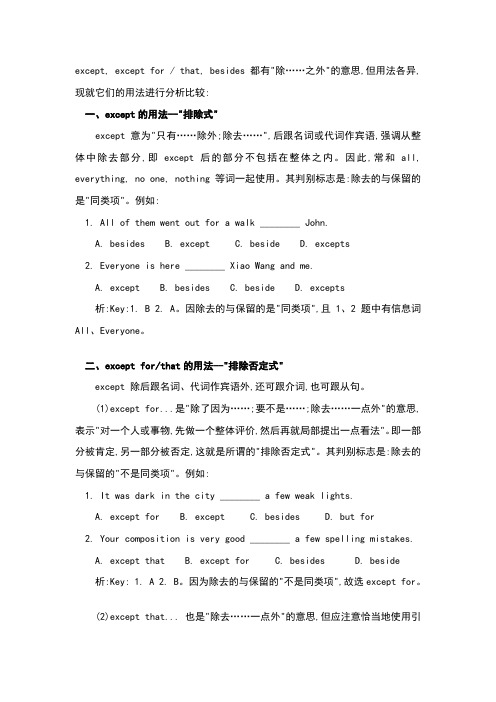
except, except for / that, besides都有"除……之外"的意思,但用法各异,现就它们的用法进行分析比较:一、except的用法--"排除式"except意为"只有……除外;除去……",后跟名词或代词作宾语,强调从整体中除去部分,即except后的部分不包括在整体之内。
因此,常和all, everything, no one, nothing等词一起使用。
其判别标志是:除去的与保留的是"同类项"。
例如:1. All of them went out for a walk ________ John.A. besidesB. exceptC. besideD. excepts2. Everyone is here ________ Xiao Wang and me.A. exceptB. besidesC. besideD. excepts析:Key:1. B 2. A。
因除去的与保留的是"同类项",且1、2题中有信息词All、Everyone。
二、except for/that的用法--"排除否定式"except 除后跟名词、代词作宾语外,还可跟介词,也可跟从句。
(1)except for...是"除了因为……;要不是……;除去……一点外"的意思,表示"对一个人或事物,先做一个整体评价,然后再就局部提出一点看法"。
即一部分被肯定,另一部分被否定,这就是所谓的"排除否定式"。
其判别标志是:除去的与保留的"不是同类项"。
例如:1. It was dark in the city ________ a few weak lights.A. except forB. exceptC. besidesD. but for2. Your composition is very good ________ a few spelling mistakes.A. except thatB. except forC. besidesD. beside析:Key: 1. A 2. B。
except和except for区别
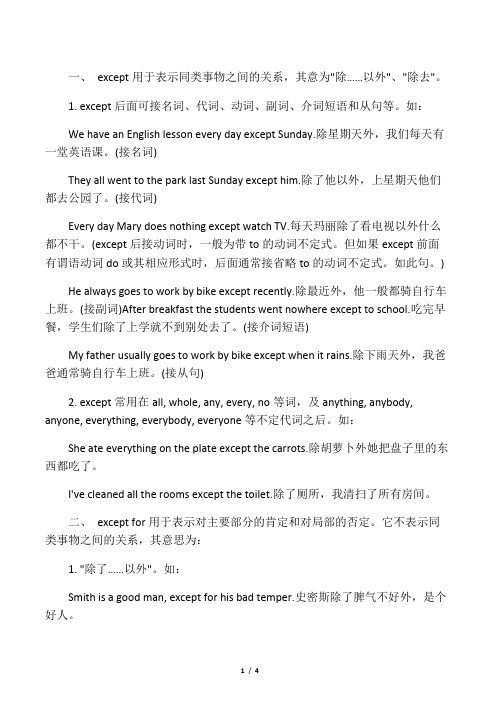
一、except用于表示同类事物之间的关系,其意为"除……以外"、"除去"。
1. except后面可接名词、代词、动词、副词、介词短语和从句等。
如:We have an English lesson every day except Sunday.除星期天外,我们每天有一堂英语课。
(接名词)They all went to the park last Sunday except him.除了他以外,上星期天他们都去公园了。
(接代词)Every day Mary does nothing except watch TV.每天玛丽除了看电视以外什么都不干。
(except后接动词时,一般为带to的动词不定式。
但如果except前面有谓语动词do或其相应形式时,后面通常接省略to的动词不定式。
如此句。
)He always goes to work by bike except recently.除最近外,他一般都骑自行车上班。
(接副词)After breakfast the students went nowhere except to school.吃完早餐,学生们除了上学就不到别处去了。
(接介词短语)My father usually goes to work by bike except when it rains.除下雨天外,我爸爸通常骑自行车上班。
(接从句)2. except常用在all, whole, any, every, no等词,及anything, anybody, anyone, everything, everybody, everyone等不定代词之后。
如:She ate everything on the plate except the carrots.除胡萝卜外她把盘子里的东西都吃了。
I've cleaned all the rooms except the toilet.除了厕所,我清扫了所有房间。
except和except for区别
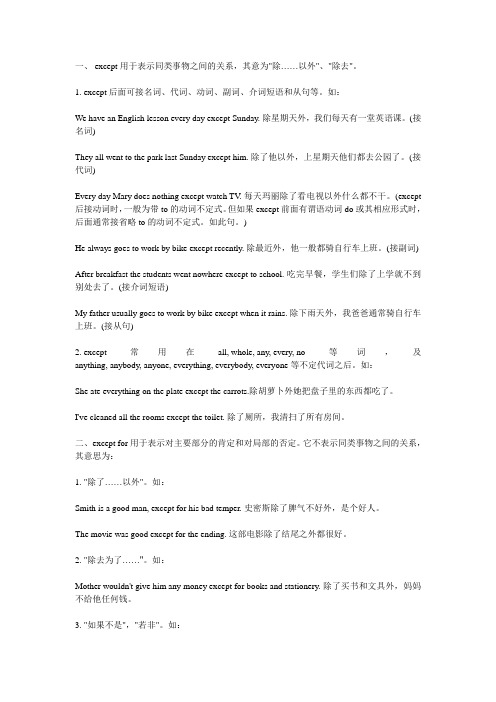
一、 except用于表示同类事物之间的关系,其意为"除……以外"、"除去"。
1. except后面可接名词、代词、动词、副词、介词短语和从句等。
如:We have an English lesson every day except Sunday. 除星期天外,我们每天有一堂英语课。
(接名词)They all went to the park last Sunday except him. 除了他以外,上星期天他们都去公园了。
(接代词)Every day Mary does nothing except watch TV. 每天玛丽除了看电视以外什么都不干。
(except 后接动词时,一般为带to的动词不定式。
但如果except前面有谓语动词do或其相应形式时,后面通常接省略to的动词不定式。
如此句。
)He always goes to work by bike except recently. 除最近外,他一般都骑自行车上班。
(接副词)After breakfast the students went nowhere except to school. 吃完早餐,学生们除了上学就不到别处去了。
(接介词短语)My father usually goes to work by bike except when it rains. 除下雨天外,我爸爸通常骑自行车上班。
(接从句)2. except常用在all, whole, any, every, no等词,及anything, anybody, anyone, everything, everybody, everyone等不定代词之后。
如:She ate everything on the plate except the carrots.除胡萝卜外她把盘子里的东西都吃了。
I've cleaned all the rooms except the toilet. 除了厕所,我清扫了所有房间。
except的用法

except的用法except有除非;除了 ... 之外;若不是等意思,那么你知道except 的用法吗?下面跟着一起来学习一下,希望对大家的学习有所帮助!except的用法大全:except的用法1:except用作介词可表示“除…之外”,通常指所排除的事物不在所述范围之内,后面可接名词或代词。
except的用法2:except可接反身代词、副词、介词短语或状语从句,也可接(省略to的)动词不定式、动名词、基数词,还可接that 或wh-从句。
except的用法3:except用作及物动词时的基本意思是“把…除外”。
引申可指“免除”,一般接人作宾语,且通常用于否定结构。
except的用法4:except与介词to或against连用,意为“反对…”; 与介词for连用表示“不包括在…之内”。
except的用法例句:1. He hadn't eaten a thing except for one forkful of salad.除了一餐叉色拉,他什么都没吃。
2. She sipped the wine. Everything was hazy now, except for Nick's face.她小口地抿着酒。
现在一切都变得模糊起来,除了尼克的脸。
3. Except for the remarkably tidy kitchen, the place was a mess.除了厨房特别干净外,这地方一片狼藉。
4. I sold everything I owned except for my car and my books.我把我所有的东西都卖掉了,只剩下汽车和书。
5. The snow, except where it drifted, was only calf-deep.除了吹得堆积起来的地方,雪只有小腿肚深。
关于except的用法及解释

关于except的用法及解释except在英语中是比较常见的一个单词,那么大家对于except的的相关知识了解多少呢?知道except的用法是什么吗?下面是小编给大家带来的关于except的用法及解释_except的用法和例句,以供大家参考,我们一起来看看吧!except的用法一、except作为介词1.除…之外,除了Everyone is ready except him.除了他,大家都准备好了.He won't work except when he is pleased.只有在高兴时他才会工作.二、except作为及物动词除去,把…除外except certain names from a list 在名单中除去某些人的名字except sb from a group 把某人从团体中开除nobody excepted 无一人例外present company excepted 在场者除外.三、except作为不及物动词1.反对conj.( 连接词 conjunction )1.【口】除外,只有I would go,except it's too far.我是要去,可是路太远了.2.【古·圣】除非except ye be born again 除非尔等再生.▼except的语法一、except的用法--"排除式"except意为"只有……除外;除去……",后跟名词或代词作宾语,强调从整体中除去部分,即except后的部分不包括在整体之内。
因此,常和all, everything, no one, nothing等词一起使用。
其判别标志是:除去的与保留的是"同类项"。
例如:1. All of them went out for a walk ________ John.A. besidesB. exceptC. besideD. excepts2. Everyone is here ________ Xiao Wang and me.A. exceptB. besidesC. besideD. excepts析:Key:1. B 2. A。
except和besides的区别
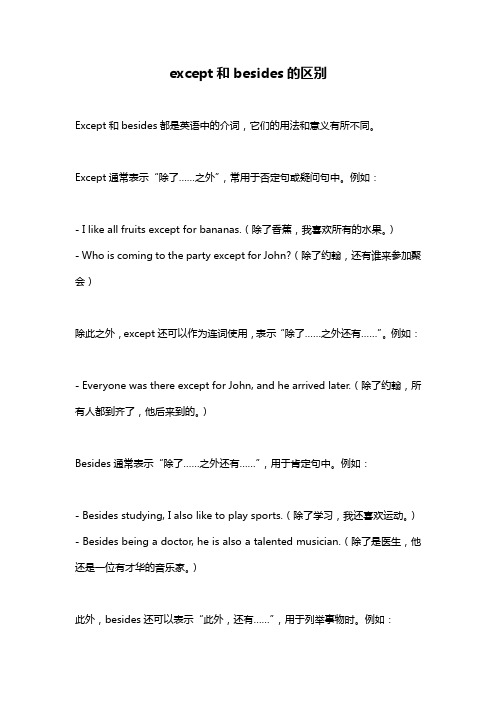
except和besides的区别
Except和besides都是英语中的介词,它们的用法和意义有所不同。
Except通常表示“除了……之外”,常用于否定句或疑问句中。
例如:
- I like all fruits except for bananas.(除了香蕉,我喜欢所有的水果。
)
- Who is coming to the party except for John?(除了约翰,还有谁来参加聚会)
除此之外,except还可以作为连词使用,表示“除了……之外还有……”。
例如:
- Everyone was there except for John, and he arrived later.(除了约翰,所有人都到齐了,他后来到的。
)
Besides通常表示“除了……之外还有……”,用于肯定句中。
例如:
- Besides studying, I also like to play sports.(除了学习,我还喜欢运动。
)- Besides being a doctor, he is also a talented musician.(除了是医生,他还是一位有才华的音乐家。
)
此外,besides还可以表示“此外,还有……”,用于列举事物时。
例如:
- Besides apples and oranges, we also have bananas and grapes.(除了苹果和橘子,我们还有香蕉和葡萄。
)
总的来说,except和besides都可以表示“除了……之外”,但是except更常用于否定句或疑问句中,而besides更常用于肯定句和列举事物时。
except,exceptfor,besides的用法和区别

except,besides,except for用法的关联和区别1.作介词用法时,这三个词都有"除…之外"的含义,但except常与do/does/did/have/has /hadnothing等词形成搭配用法,或者与全部肯定词all、everything、ev?eryone等连用,或者与全部否定词nothing、nobody等连用,因此except加宾语作介词"除…之外"时常表示从整体中剔除一部分;而besides作"除…之外"时则表示"另外附加"的含义,相当于"in addition to"。
试比较下列例句:1)He did not hing except watch TV yesterday.2)He said nothing except to smile just now.3)All the students took at rip except Tom yesterday. 4)We need 3 more persons to finish the job besides/inaddition to us two.2.作介词用法时的except后可接多种情况的介词短语。
在这种情况下,except后的介词是不可省去的,except加介词的实际作用就相当于连词加相关的从句。
例如:1)The weather is fine today except in the northwest.此句相当于: The weather is fine today except that it is in the northwest.2)His mother never takes any exercise except on the dance floor.此句相当于: His mother never takes any exercise except that she has adance on the floor.需要强调的是except与exceptfor的用法区别:1)Except后排除的内容与主语往往是同一类的,而exceptfor后所排除的内容与主语往往不是同一类的。
except except for beside的区别

except except for beside的区别摘要:1.引言:except,except for,beside的区别2.except用法详解3.except for用法详解4.beside用法详解5.总结:except,except for,beside在日常写作中的应用正文:在日常英语写作中,except,except for和beside这三个短语都有排除或除外的意思,但它们的用法和含义略有不同。
在这篇文章中,我们将详细解析这三个短语的区别,并探讨如何在写作中恰当地使用它们。
首先,我们来看except和except for的用法。
except的意思是“除…之外”,它用于从整体中排除某个部分。
except for则表示“除了…之外”,主要用于对某个事物进行修正或补充。
例如:1.except:All the students except Tom attended the party.(除汤姆外,所有学生都参加了派对。
)2.except for:The cake was delicious except for the frosting.(除了奶油外,蛋糕非常美味。
)接下来,我们来探讨beside这个短语的用法。
beside的意思是“在…旁边”,用于表示位置或方向的并列。
例如:3.beside:She sat down beside me and started talking to me.(她坐在我旁边开始和我聊天。
)总之,except,except for和beside在写作中有不同的用法和含义。
except和except for用于表示排除或例外,而beside则用于表示并列关系。
在日常生活和学习中,我们可以根据实际情况选择合适的短语来表达我们的意思。
except及exceptfor区别
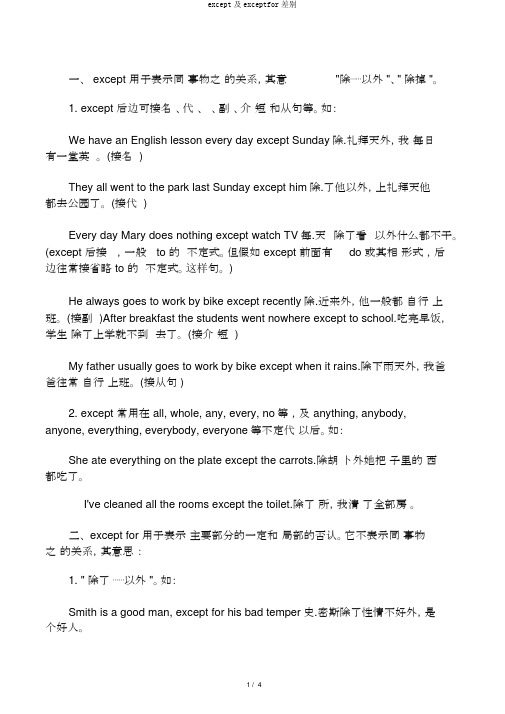
一、 except 用于表示同事物之的关系,其意"除⋯⋯以外 "、" 除掉 "。
1.except 后边可接名、代、、副、介短和从句等。
如:We have an English lesson every day except Sunday除.礼拜天外,我每日有一堂英。
(接名 )They all went to the park last Sunday except him除.了他以外,上礼拜天他都去公园了。
(接代 )Every day Mary does nothing except watch TV每.天除了看以外什么都不干。
(except 后接,一般 to 的不定式。
但假如 except 前面有 do 或其相形式,后边往常接省略 to 的不定式。
这样句。
)He always goes to work by bike except recently除.近来外,他一般都自行上班。
(接副 )After breakfast the students went nowhere except to school.吃完早饭,学生除了上学就不到去了。
(接介短 )My father usually goes to work by bike except when it rains.除下雨天外,我爸爸往常自行上班。
(接从句 )2.except 常用在 all, whole, any, every, no等,及 anything, anybody, anyone, everything, everybody, everyone等不定代以后。
如:She ate everything on the plate except the carrots.除胡卜外她把子里的西都吃了。
I've cleaned all the rooms except the toilet.除了所,我清了全部房。
except和except for的区别

except和except for的区别except和except for表示的是一种排除关系,意思是“除了什么之外,不再有……”。
但except后面跟的词和主语一般是同类事物,而except for后面跟的词往往和主语不是同一类事物。
except for与except的区别一、except表示“除去,不包括”,强调所排除的“不包括在内”,一般表示同类之间的关系,常同nothing,all, none, nobody, any等不定代词以及every连用。
except 经常接名词或代词,但也可接副词,介词短语。
例如:1.You can have any of the cakes except this one. 除了这块蛋糕,你哪块都能吃。
2.She saw nothing except snow. 除了雪她什么也没看见。
二、except经常接名词、代词,也可接副词,介词短语,不带to的不定式或从句等。
例如:1.She doesn’t do anything except sit and watch TV. 除了坐着看电视外,她什么也不做。
2.He usually goes to work by bicycle except when it rains.除了下雨的时候,他通常骑自行车去上班。
三、except for也表示“除…以外”,指对某种基本情况进行具体的细节方面的修正。
它同except的区别是:except for后接的词同句子中的整体词(主语)不是同类的,指从整体中除去一个细节,一个方面;而except后接的词同整体词(主语)一般是同类,指在同类的整体中除去一个部分。
例如:1.I can answer all the questions except for the last one.除了最后一题外,所有题目我都可以解答。
2.Your writing is good except for a few grammar mistakes. 除了几处语法错误外,你的作文写得很好。
牛津英语Except,except for和excepting用法辨析
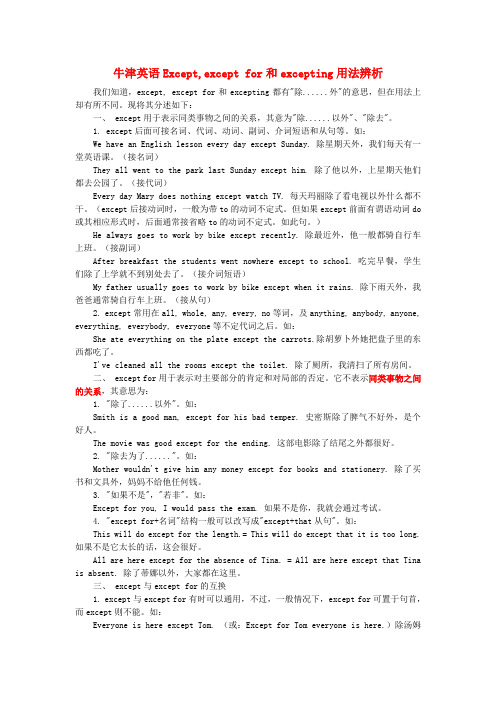
牛津英语Except,except for和excepting用法辨析我们知道,except, except for和excepting都有"除......外"的意思,但在用法上却有所不同。
现将其分述如下:一、 except用于表示同类事物之间的关系,其意为"除......以外"、"除去"。
1. except后面可接名词、代词、动词、副词、介词短语和从句等。
如:We have an English lesson every day except Sunday. 除星期天外,我们每天有一堂英语课。
(接名词)They all went to the park last Sunday except him. 除了他以外,上星期天他们都去公园了。
(接代词)Every day Mary does nothing except watch TV. 每天玛丽除了看电视以外什么都不干。
(except后接动词时,一般为带to的动词不定式。
但如果except前面有谓语动词do 或其相应形式时,后面通常接省略to的动词不定式。
如此句。
)He always goes to work by bike except recently. 除最近外,他一般都骑自行车上班。
(接副词)After breakfast the students went nowhere except to school. 吃完早餐,学生们除了上学就不到别处去了。
(接介词短语)My father usually goes to work by bike except when it rains. 除下雨天外,我爸爸通常骑自行车上班。
(接从句)2. except常用在all, whole, any, every, no等词,及anything, anybody, anyone, everything, everybody, everyone等不定代词之后。
except和except_for区别
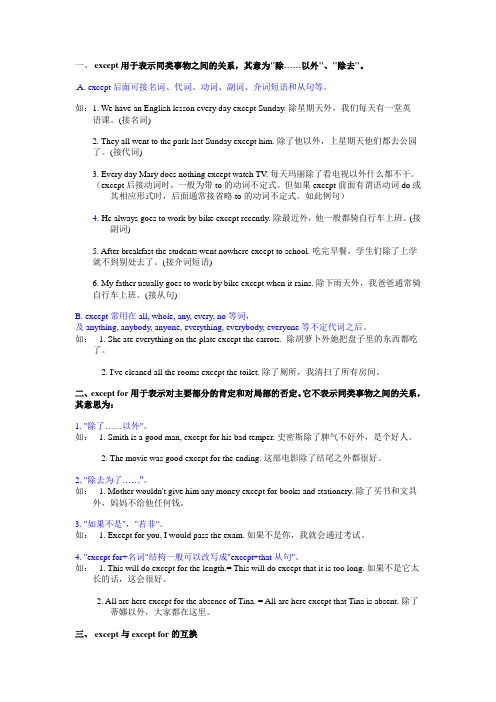
一、 except用于表示同类事物之间的关系,其意为"除……以外"、"除去"。
.A. except后面可接名词、代词、动词、副词、介词短语和从句等。
如:1. We have an English lesson every day except Sunday. 除星期天外,我们每天有一堂英语课。
(接名词)2. They all went to the park last Sunday except him. 除了他以外,上星期天他们都去公园了。
(接代词)3. Every day Mary does nothing except watch TV. 每天玛丽除了看电视以外什么都不干。
(except后接动词时,一般为带to的动词不定式。
但如果except前面有谓语动词do或其相应形式时,后面通常接省略to的动词不定式。
如此例句)4.He always goes to work by bike except recently. 除最近外,他一般都骑自行车上班。
(接副词)5. After breakfast the students went nowhere except to school. 吃完早餐,学生们除了上学就不到别处去了。
(接介词短语)6. My father usually goes to work by bike except when it rains. 除下雨天外,我爸爸通常骑自行车上班。
(接从句)B. except常用在all, whole, any, every, no等词,及anything, anybody, anyone, everything, everybody, everyone等不定代词之后。
如: 1. She ate everything on the plate except the carrots. 除胡萝卜外她把盘子里的东西都吃了。
except与except_for的区别
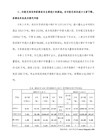
1. All of them went out for a walk ________ John.
A. besides B. except C. beside D. excepts
2. Everyone is here ________ Xiao Wang and me.
A. except B. besides C. beside D. excepts
需要强调的是except与exceptfor的用法区别:
1)Except后排除的内容与主语往往是同一类的,而exceptfor后所排除的内容与主语往往不是同一类的。例如,试比较:
All the buildings are excellent except this one.
All the buildings are excellent except for their location或者All the buildings are excellent except that the place on which the buidings are built is notgood.
⑨ I can answer all the questions except for the last one. 除了最后一题外,所有题目我都可以解答。
⑩ Your writing is good except for a few grammar mistakes. 除了几处语法错误外,你的作文写得很好。
A. except that B. except for
C. besides D. beside
析:Key: 1. A 2. B。因为除去的与保留的"不是同类项",故选except for。
except在python中的用法

except在python中的用法在Python中,`except`用于捕获和处理异常。
它通常与`try`一起使用,形成异常处理的代码块。
以下是`except`的一般语法:```try:# 可能引发异常的代码except ExceptionType:# 异常处理代码```在这个语法中,`try`代码块包含了可能会引发异常的代码。
如果在`try`代码块中引发了指定类型的异常(`ExceptionType`),则执行相应的`except`代码块来处理异常。
以下是一些常见的`except`的用法示例:1. 捕获所有类型的异常:```pythontry:# 可能引发异常的代码except:# 异常处理代码```这种情况下,不指定具体的异常类型,`except`将捕获所有类型的异常。
2. 捕获多个异常类型:```pythontry:# 可能引发异常的代码except (ExceptionType1, ExceptionType2):# 异常处理代码```在括号中指定多个异常类型,如果引发的异常类型在列表中,则执行相应的`except`代码块。
3. 捕获特定类型的异常:```pythontry:# 可能引发异常的代码except ExceptionType:# 异常处理代码```在`except`后指定特定的异常类型,只有当引发的异常类型与指定的类型匹配时,才执行相应的`except`代码块。
4. 捕获异常对象:```pythontry:# 可能引发异常的代码except ExceptionType as e:# 使用异常对象进行处理```通过`as`关键字将引发的异常赋值给变量`e`,可以在`except`代码块中使用该变量来访问异常对象的信息。
5. 捕获所有异常类型并打印错误信息:```pythontry:# 可能引发异常的代码except Exception as e:print("An error occurred:", str(e))```这种情况下,异常对象的信息被转化为字符串并打印出来。
- 1、下载文档前请自行甄别文档内容的完整性,平台不提供额外的编辑、内容补充、找答案等附加服务。
- 2、"仅部分预览"的文档,不可在线预览部分如存在完整性等问题,可反馈申请退款(可完整预览的文档不适用该条件!)。
- 3、如文档侵犯您的权益,请联系客服反馈,我们会尽快为您处理(人工客服工作时间:9:00-18:30)。
Except, except for 和excepting 用法辨析
我们知道,except, except for和excepting都有"除……外"的意思,但在用法上却有所不同。
现将其分述如下:
一、except用于表示同类事物之间的关系,其意为"除……以外"、"除去"。
1. except后面可接名词、代词、动词、副词、介词短语和从句等。
如:
We have an English lesson every day except Sunday. 除星期天外,我们每天有一堂英语课。
(接名词)
They all went to the park last Sunday except him. 除了他以外,上星期天他们都去公园了。
(接代词)
Every day Mary does nothing except watch TV. 每天玛丽除了看电视以外什么都不干。
(except后接动词时,一般为带to的动词不定式。
但如果except前面有谓语动词do或其相应形式时,后面通常接省略to的动词不定式。
如此句。
)
He always goes to work by bike except recently. 除最近外,他一般都骑自行车上班。
(接副词)
After breakfast the students went nowhere except to school. 吃完早餐,学生们除了上学就不到别处去了。
(接介词短语)
My father usually goes to work by bike except when it rains. 除下雨天外,我爸爸通常骑自行车上班。
(接从句)
2. except常用在all, whole, any, every, no等词,及anything, anybody, anyone, everything, everybody, everyone等不定代词之后。
如:
She ate everything on the plate except the carrots.除胡萝卜外她把盘子里的东西都吃了。
I've cleaned all the rooms except the toilet. 除了厕所,我清扫了所有房间。
二、except for用于表示对主要部分的肯定和对局部的否定。
它不表示同类事物之间的关系,其意思为:
1. "除了……以外"。
如:
Smith is a good man, except for his bad temper. 史密斯除了脾气不好外,是个好人。
The movie was good except for the ending. 这部电影除了结尾之外都很好。
2. "除去为了……"。
如:
Mother wouldn't give him any money except for books and stationery. 除了买书和文具外,妈妈不给他任何钱。
3. "如果不是","若非"。
如:
Except for you, I would pass the exam. 如果不是你,我就会通过考试。
4. "except for+名词"结构一般可以改写成"except + that从句"。
如:
This will do except for the length.= This will do except that it is too long. 如果不是它太长的话,这会很好。
All are here except for the absence of Tina. = All are here except that Tina is absent. 除了蒂娜以外,大家都在这里。
三、except与except for的互换
1. except与except for有时可以通用,不过,一般情况下,except for可置于句首,而except 则不能。
如:
Everyone is here except Tom. (或:Except for Tom everyone is here.)除汤姆外,大家都到了。
2. except与except for在句中也可互换。
一般来说,否定句中用except,肯定句式可以用except for来替换。
如:
This article has no blunders except a few mistakes.这篇文章除了一点小错外没有大错。
此句可改为:This article is instructive except for a few blunders. 这篇文章除了有些错误外,是有教育意义的。
不过,在前后有相称的同类词语时,应用except,否则用except for。
如:
We come to school every day except Sunday. 除星期天外,我们天天上学。
(句中every day 与Sunday同类)
This dress is ready except for the buttons. 衣服做好了,只是钮扣未缝上。
(句中ready与buttons不同类)
四、excepting是由动词转化而来的分词介词,用法较正式,含有较强的动态意味,意为"把……除外",与except在用法上有不同之处:
1. 可用于句首,或用于not, without, always等词后;
2. 其后常常用名词或代词。
如:
Bruce answered all the questions excepting the last one. 除了最后一个问题外,布鲁斯都答出来了。
Excepting Sundays, the library is open daily. 除了星期天外,图书馆天天开放。
I think we must keep improving our English not excepting those who have mastered it. 我认为我们必须不断提高我们的英语水平,对那些已掌握了英语的人也不例外。
All the people in my family go to work every day, always excepting my youngest sister. 我家所有的人每天都上班,除了我那个最小的妹妹以外。
巩固练习:
用except, except for或excepting填空。
1. She usually goes to work on her bike ________ when it rains.
2. The whole staff, not ________ the heads of departments, went to the playground.
3. His account is correct ________ that some details are omitted (省略,遗漏).
4. The office is empty ________ Alice.
5. I would go ________ it's too late.
6. All the essays are good ________ John's.
7. Everybody must study, ________ those who have a better grasp of Marxism.
8. The wall was bare ________ a map of the world.
9. I have looked for my wallet everywhere ________ there.
10. I would join you ________ my headache.
11. We can ask him for some advice at any time ________ during his holidays.
12. His composition is good, ________ some spelling mistakes.
13. John wasn't remembered, ________ by some of us who had known him.
14. There was silence in the room, ________ the tick of the clock on the wall.
15. The pair of trousers fits me well ________ the waist of it is a little too small.
Key:
1. except
2. excepting
3. except
4. except for
5. except
6. except
7. excepting
8. except for
9. except 10. except for 11. except 12. except for 13. except 14. except for 15. except。
